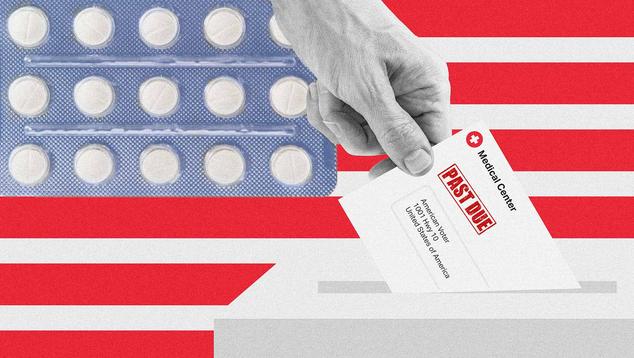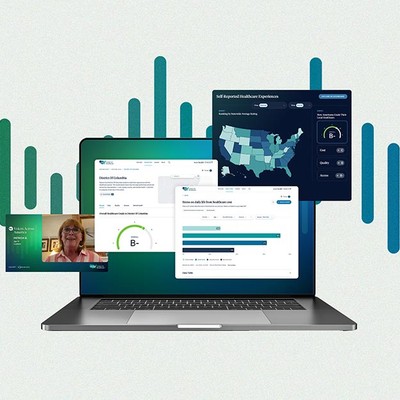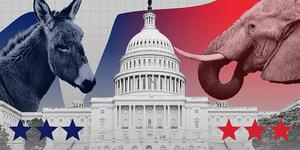Editor's Note: This research was conducted in partnership with West Health, a family of nonprofit and nonpartisan organizations focused on healthcare and aging.
WASHINGTON, D.C. -- Healthcare issues, especially those related to cost of and access to care, are an important top-of-mind policy area for many American voters. Yet, a new poll from West Health and Gallup shows that a majority of Americans say healthcare is not receiving enough attention in the 2024 presidential campaign so far. The upcoming vice presidential debate presents a unique opportunity for the two campaigns to address these concerns and lay out their plans for healthcare policy.
The findings reported here are from a study fielded Sept. 9-16 via web using the Gallup Panel, with 2,398 respondents surveyed before the Sept. 10 presidential debate and 1,262 surveyed after it, for a total of 3,660 respondents. Attitudes reported here did not vary significantly for respondents interviewed before and after the debate.
1. Two in three Americans -- including majorities of both political parties -- say healthcare is not receiving enough attention during the presidential campaign so far.
Overall, 67% of U.S. adults say healthcare is not receiving enough attention during the 2024 presidential campaign, while 6% say it is getting too much attention and 27% the right amount. Democrats and independents are more likely than Republicans to say healthcare is not getting enough attention during the current presidential campaign. That said, more than half of Republicans (53%) agree that it is not getting enough attention.
Among the respondents who said they watched the presidential debate on Sept. 10, similar numbers (71%) report that the candidates did not spend enough time on healthcare-related issues during the debate. This attitude is held by 77% of Democrats, 74% of independents and 57% of Republicans who watched the debate.
2. While independents are slightly more trusting of Harris than Trump when it comes to acting on key healthcare issues, about a third report not trusting either candidate.
Americans’ levels of trust in the presidential candidates to tackle key issues related to cost and quality of healthcare fall along political party lines, with solid majorities of Republicans saying Donald Trump is more trusted to handle the issues and the vast majority of Democrats saying Kamala Harris is. Political independents are slightly more likely to report trusting Harris over Trump on these healthcare issues. This is especially true when it comes to improving access to care and insurance coverage as well as protecting or strengthening Medicare. On these two topics, independents are more than 10 points more likely to say they trust Harris over Trump.
About a third or more of independents report they don’t trust either candidate across all the healthcare issues polled, suggesting that a significant portion of potential swing voters are cynical in how they feel about both candidates on healthcare.
3. Nearly half of Americans report that a candidate’s position on lowering drug costs and mental healthcare policy are important issues in determining their vote in the upcoming election.
A candidate’s position on protecting Medicare and Social Security is the single most or among the most important healthcare-related issues in determining 63% of Americans’ vote in the upcoming presidential election, while a candidate’s position on lowering the cost of healthcare (57%) is close behind.
The importance of a candidate’s position on mental healthcare (43%) is near the same level of importance as reducing drug costs (47%) as the single most or among the most important issues determining their vote. This mirrors Americans’ broader dissatisfaction with this issue area, as 73% say the government is not doing enough to ensure the public has access to affordable mental healthcare.
4. Protecting Medicare and lowering drug costs are among the most important issues older Americans care about when determining their vote.
The importance of certain healthcare issues to a person’s vote differs among older versus younger Americans. Americans 65 and older are much more likely than those 18 to 49 to say a candidate’s positions on protecting Medicare and Social Security and lowering drug costs are among the most important issues or the single most important issue in determining their vote. Conversely, younger and older voters place about equal importance on a candidate’s positions on lowering healthcare costs and their mental healthcare policies.
Democrats are more likely than Republicans and independents to say that various healthcare-related issues are at least among the most important when determining their vote in the upcoming election. Independents fall roughly between Republicans and Democrats when it comes to the importance of these issues.
Age differences are apparent within the party groups. On the issue of protecting Medicare and Social Security, 74% of Republicans over 65, and 68% of those 50 to 64, say this is the single most or among the most important issues determining their vote, compared with 40% of Republicans 18 to 49. Similarly, 94% of Democrats 65 and older, and 85% of those aged 50 to 64, say this is the single most or among the most important issues, compared with 58% of Democrats 18 to 49. Independents follow the same pattern.
5. Democrats are much more optimistic than Republicans and independents about improving access to affordable healthcare in the next five years.
The most recent numbers from the West Health-Gallup Healthcare Affordability Index show that just over half of the American public say they can pay for medicine or healthcare if they needed it today, declining from a high of 61% in 2022.
When asked how likely it is that access to affordable healthcare will improve in the next five years, Democrats express optimism, while Republicans and independents are pessimistic. Fifty-eight percent of Democrats believe access is very or somewhat likely to improve, while majorities of Republicans (70%) and independents (64%) say improvement is not very or not at all likely.
Implications
Americans want more attention paid to lowering healthcare costs, an issue that has not had as much visibility in this presidential campaign compared with previous ones. This is especially true for Americans aged 65 and older. Majorities of older Republicans and older Democrats say a candidate’s plan for protecting Medicare and Social Security is crucial to their vote choice.
The 65 and older population is a significant voting bloc in the U.S. In 2020, the population of Americans 65 and older reached a high of 55.8 million, accounting for roughly 17% of the population. That number is likely larger today, as the U.S. Census Bureau estimates by 2025, the 65+ population will reach 63.3 million.
Although other political issues may be overshadowing healthcare in the current election, Americans continue to have serious concerns about their ability to afford the healthcare they need. Data from this study show that more than two in three Americans (67%) are very or somewhat concerned that a major health event could lead to medical debt, including 62% of Republicans, 67% of independents and 71% of Democrats. Issues related to the cost and accessibility of healthcare directly impact the day-to-day life of every voter, regardless of their political party affiliation.
To stay up to date with the latest Gallup News insights and updates, follow us on X @Gallup.
Learn more about how the Gallup Panel works.





